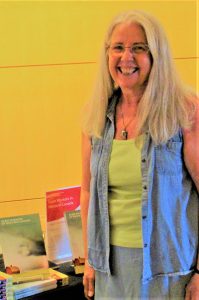Shirley McDonald is a lecturer in the Department of English and Cultural Studies, teaching classes in English with a focus on the teaching of academic writing. Dr. McDonald moved to the Okanagan with her family in 1994, and completed her BA in 1999 at Okanagan university College (now UBCO). She went on to finish her graduate degrees in Alberta, and returned to UBCO in 2008 when she was hired to create the first online course for the English Department. She continues to teach English courses in the department, drawing on her own research to provide students with meaningful topics on which to write.
Dr. McDonald has published articles in a/b: Auto/Biography Studies, ARIEL, Prairie Forum, and several Canadian studies journals. She has an essay in Gary Geddes: Essays on His Works, and two chapters and accompanying material in Farm Workers in Western Canada: Injustices and Activism, co-edited with Bob Barnetson (U of Alberta Press 2016).
Dr. McDonald shared some insights on her research and teaching practices here at UBC Okanagan.
How did you know you wanted to be a professor?
That realization came to me as a surprise when I was in my forties. I had planned to become a professional writer. I’d always been a writer. I won an award for a short story when I was in grade six. Writing was the one discipline that stuck with me over the many years of my assorted studies in liberal arts, fine arts, and music (voice). I dropped out of college to head out on the road with my band, but I kept writing even then, and even moreso as I settled down to raise a family. When my children were all in school, I returned to university. I went to SFU where I had the good fortune of studying poetry with Roy Miki and publishing the essay I wrote for Roy’s course. I still had a long way to go, however, to complete my BA.
The professor who inspired me to join the ranks of academia is John Lent. John is one of my favourite people on the planet. When I met him, I was writing a lot of poetry and a handful of poems earned a spot for me as a literary delegate at the BC Festival of the Arts. Two of the them, “The Turning” and “Pears”, are published in The New Quarterly. I also wrote a short story, “Out of Time”, which earned my spot as a literary delegate a second time. The story is published in Chasing Halley’s Comet: Winners of the Federation of BC Writers’ Festival Competition. John celebrated with me at a launch at Red Dog Books in Vernon. I also wrote a novel, which I workshopped in his fiction class. John’s generous and kind support helped my confidence grow. John encourage me to further my development as a writer and editor, but also as a teacher. To that end, I focused on writing-intensive courses during my doctoral program.
What is your own process in writing?
Like singing, writing is a performance and a prolonged embodied experience. I can be lost for hours in the alternate reality of my imagination. When a story begins to form, my surroundings fade and, as if I were merely a medium, the words seem to will themselves into existence. Later, I edit and restructure and cut and revise. The thing is that writing requires emotional and cognitive energy and lately, because teaching uses up my reserves, I have nothing left for the creative process. I take comfort in believing that I will have that energy again in my retirement and will resume my daily writing practice.
What kind of learning experiences do offer your students?
The creation of academic essays requires research before the writing process begins. Research yields evidence that requires documentation. Many students arrive at university with little awareness of how to or even the need to document that evidence. Thus, I developed a contextual method (models based on course readings) to teach students how to document their sources as they learn to write. Although I designed this practice-based approach for use in the classroom, I have found it to be equally successful in online learning. Teaching online is not the kind of performance that it is in the classroom where I have a presence. Online delivery requires my skills as a course designer to build the learning tools, as a technician to build the platform, then as a teacher and an editor to monitor and lead students through the learning process. The editing part, which takes place during the running of the course, requires hours of intense focus as I respond one by one to students’ exercises and essays, and provide each student with encouragement and with individual attention and guidance according to their writing strengths and weaknesses.
